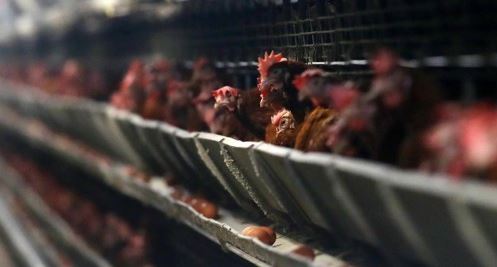South Korea will take steps to enhance the overall environment of poultry farms and ban sales of live chickens and ducks to prevent future outbreaks of avian influenza, the agriculture ministry said Thursday.
The Ministry of Agriculture, Food and Rural Affairs said in a joint statement that it will work with a number of different organizations to better prevent bird flu as the country has witnessed several serious outbreaks in recent years, including one that led to the culling of over 33 million birds.
Most local poultry farms raise egg-laying hens in battery cages smaller than an A4 sheet of paper, barely over the minimum requirement. Keeping animals in such close confinement enables the disease to spread rapidly.
 |
(Yonhap) |
The strengthened quarantine measures are part of a broader plan to enhance poultry-rearing conditions as a series of bird flu outbreaks and sales of eggs contaminated with harmful insecticides has sparked public anxiety.
As part of moves to expand "eco-friendly" farms, the ministry said it will strengthen hygiene regulations and revise rules governing densely populated cages by 2020.
"The government came up with a set of comprehensive quarantine measures to create an avian influenza-free environment," the statement said. "Prevention of avian influenza faces limits if the poultry industry does not enhance the environment at farms and get rid of the blind spot in vaccinations."
The government also plans to ban the trade of live chickens and ducks at outdoor traditional markets by 2022 to improve animal hygiene at the wholesale level.
This year, it will start the registration of butchers and meat shops at traditional markets, and conduct regular inspections of poultry production during the distribution process.
Currently, live chickens and ducks are traded at 200 markets nationwide, accounting for 35 percent of the country's annual chicken supply of 43 million, according to the ministry.
To better take preventive measures, the ministry will help set up monitoring cameras at over 5,000 poultry farms by next year to put them under closer watch.
In addition, the ministry will provide tracking information of migratory birds at home and abroad, and issue warnings when suspected cases are found in neighboring nations.
Migratory birds are believed to bring in avian influenza strains to South Korea, triggering outbreaks.
In addition to broader changes, Seoul is pushing to complete inspections and vaccinations of birds at local farms by September, as well as enhance monitoring and take heightened safety measures in the next four months to prepare for the PyeongChang Winter Olympics, slated for February, it noted.
In light of safety concerns over eggs contaminated with pesticides, such as bifenthrin and fipronil, the government vowed to step up inspections from the production to the distribution of eggs starting next month.
The government currently conducts tests on 27 kinds of pesticides, but some of the contaminated eggs were found to be tainted with dichlorodiphenyltrichloroethane, a poisonous pesticide that was banned nearly 40 years ago.
When testing for fipronil and imidacloprid, a pesticide designed to control ants, cockroaches and other insects, officials will look into metabolite and excrement of animals as well.
The US Environmental Protection Agency classifies both bifenthrin and fipronil as "possible human carcinogens." (Yonhap)








